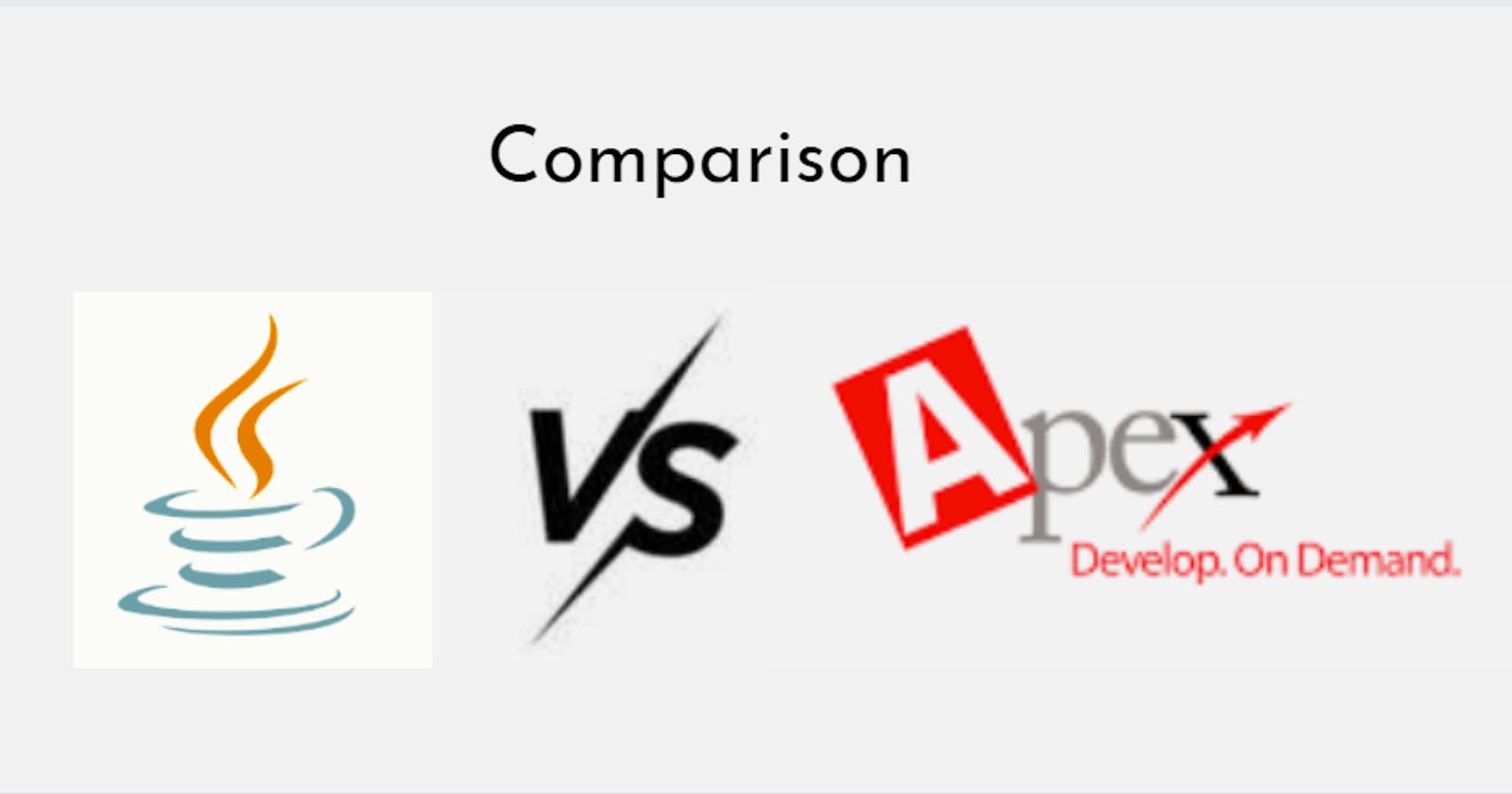Introduction
In the ever-evolving world of software development, choosing the right programming language is a critical decision. It determines the ease of development, performance, scalability, and potential for future growth. Two popular programming languages that often enter the discussion are Apex and Java. While Apex is specifically designed for the Salesforce platform, Java is a versatile language used in various domains. In this article, we will delve deeper into the comparison between Apex and Java, exploring their syntax, object-oriented capabilities, platform integration, development ecosystems, use cases, performance, and community support. By the end, you'll be equipped with the knowledge to make an informed decision for your specific development requirements.
1. What is Apex?
To begin our exploration, let's take a closer look at Apex. Apex is a programming language developed by Salesforce specifically for building applications on the Salesforce platform. It is a strongly typed, object-oriented language that integrates seamlessly with the Salesforce infrastructure. Apex is primarily used to extend the functionalities of Salesforce and create custom applications within the platform.
2. What is Java?
Java, on the other hand, is a general-purpose programming language that has gained immense popularity since its inception. It was developed by Sun Microsystems (now owned by Oracle Corporation) and released in 1995. Java follows the principle of "write once, run anywhere," meaning that Java code can run on any device with a Java Virtual Machine (JVM). Java's versatility and extensive ecosystem have made it one of the most widely used programming languages today.
3. Syntax and Structure
When comparing Apex and Java, it's important to examine their syntax and structure. Apex's syntax is similar to that of Java, intentionally designed to be familiar to Java developers. This similarity makes it easier for Java developers to transition to Apex. However, Apex does have its own specific keywords and constructs tailored for Salesforce development. On the other hand, Java follows a C-like syntax and has its own set of language features and conventions.
4. Object-Oriented Programming
Both Apex and Java are object-oriented languages, which means they are built around the concept of objects, classes, inheritance, and polymorphism. Object-oriented programming allows developers to create modular, reusable code and promotes better organization and maintenance of software systems.
In Apex, the object-oriented capabilities are tightly integrated with Salesforce's data model and platform-specific functionalities. This integration enables developers to interact with Salesforce objects and services seamlessly. Apex classes are used to define objects and their behavior, allowing developers to create custom functionality within the Salesforce platform.
Java, being a general-purpose language, provides more flexibility in terms of object-oriented programming. It allows developers to create classes, objects, and interfaces to build modular and reusable components. Java's object-oriented nature makes it well-suited for building complex systems and software architectures.
5. Platform Integration
One of the key distinctions between Apex and Java is their integration with different platforms.
Apex is tightly integrated with the Salesforce platform. It is the native language used for developing applications within Salesforce. Apex provides direct access to Salesforce's data model and services, making it easy to interact with and manipulate Salesforce data. This platform integration enables developers to customize Salesforce functionalities, automate business processes, and create tailored user interfaces.
On the other hand, Java is not tied to any specific platform. It is a general-purpose language that can be used for a wide range of applications. Java code can run on any device with a JVM, allowing it to be utilized in web development, enterprise software, mobile applications, and more. This platform independence has contributed to Java's popularity and widespread adoption.
6. Development Ecosystem
The development ecosystem surrounding a programming language plays a crucial role in a developer's productivity, access to tools, and availability of resources.
For Apex, the development ecosystem is centered around the Salesforce platform. Salesforce provides a comprehensive set of tools, resources, and documentation specifically tailored for Apex development. Salesforce Developer Console is the integrated development environment (IDE) designed for coding and debugging Apex applications. Additionally, Salesforce Trailhead offers interactive learning paths and modules for mastering Apex development.
Java, being a widely adopted language, has a mature and extensive development ecosystem. There are multiple IDEs available for Java development, such as Eclipse, IntelliJ IDEA, and NetBeans, providing developers with a choice based on their preferences. Java also has a vast collection of libraries, frameworks, and tools that simplify development tasks and enhance productivity. The official Oracle documentation and Java tutorials are valuable resources for learning Java and exploring its features.
7. Use Cases for Apex
Apex finds its primary use within the Salesforce ecosystem. It is the go-to language for developing Salesforce-specific applications and customizing the functionalities of the platform. With Apex, developers can automate business processes, create custom user interfaces, and integrate with external systems. Whether it's building custom objects, implementing complex business logic, or creating triggers and workflows, Apex empowers developers to extend the capabilities of Salesforce to meet unique business requirements.
8. Use Cases for Java
Java, with its versatility and broad adoption, is used in a wide range of applications. Here are some popular use cases for Java:
Web Application Development:
Java's extensive ecosystem, frameworks (such as Spring and JavaServer Faces), and libraries make it an excellent choice for developing robust and scalable web applications. Java's support for multithreading also enables efficient handling of concurrent requests.
Enterprise Software Development:
Java's reliability, scalability, and rich tooling make it a preferred language for developing enterprise software systems. Java's ability to handle large-scale projects, coupled with its extensive library support, enables developers to build complex applications for diverse business needs.
Android App Development:
Java was the primary programming language for Android app development until the introduction of Kotlin. However, Java remains a popular choice for developing Android applications due to its vast community, extensive documentation, and existing codebases.
Scientific and Big Data Applications:
Java, with frameworks like Apache Hadoop and Apache Spark, is widely used for developing scientific and big data applications. Java's performance and scalability make it suitable for processing and analyzing large datasets.
These are just a few examples of Java's wide-ranging applications. Its versatility allows it to be used in various domains, from finance and healthcare to gaming and IoT.
9. Performance Considerations for Apex
When considering performance in Apex, it's important to understand that Apex's performance is influenced by the underlying Salesforce infrastructure. Salesforce imposes certain governor limits to manage resources and maintain the stability and performance of the platform. These limits control the amount of resources, such as CPU time and database queries, that an Apex transaction can consume. Developers must be mindful of these limits and optimize their code to avoid hitting them.
Optimizing Apex code involves strategies like efficient query usage, bulk processing, asynchronous execution, and minimizing the number of SOQL queries and DML statements. By adhering to best practices and understanding the governor limits, developers can ensure that their Apex code performs optimally within the Salesforce platform.
10. Performance Considerations for Java
Java is known for its performance and scalability. Its performance is a result of the Java Virtual Machine (JVM) and its ability to optimize code execution. Java's Just-In-Time (JIT) compilation dynamically translates bytecode into machine code, which leads to efficient execution.
To optimize Java code performance, developers can employ techniques such as proper memory management, efficient algorithm implementations, multithreading, and utilizing appropriate data structures. Profiling tools like VisualVM and Java Mission Control can help identify performance bottlenecks and fine-tune Java applications for optimal performance.
Additionally, Java offers various performance optimization libraries and frameworks, such as Apache Commons and Guava, that provide ready-to-use solutions for common performance-related challenges.
11. Apex Community and Support
The Apex community primarily consists of Salesforce developers. Salesforce provides a platform-specific developer community where developers can collaborate, share knowledge, and seek support. The Salesforce Developer Community offers forums, documentation, blogs, and other online resources dedicated to Apex development. Salesforce also organizes events and conferences that bring the Apex community together for learning and networking opportunities.
12. Java Community and Support
Java has a vast and active developer community. Numerous online forums, communities, and resources are available for Java developers to connect, learn, and contribute. Platforms like Stack Overflow, Reddit, and Java-specific forums provide avenues for developers to seek help and share their knowledge. Additionally, Oracle, the steward of Java, maintains the official Java website, which includes comprehensive documentation, tutorials, and guides.
The Java community is known for its continuous development and updates. Java has a well-defined process for evolving the language through Java Specification Requests (JSRs) and Java Community Process (JCP). These processes ensure that the Java language remains relevant, up-to-date, and aligned with the evolving needs of developers.
Conclusion
In conclusion, Apex and Java serve different purposes in the programming landscape. Apex is specialized for Salesforce development, enabling developers to create custom applications and extend the capabilities of the Salesforce platform. Its tight integration with Salesforce's infrastructure and object model makes it an efficient choice for Salesforce-specific use cases.
Java, on the other hand, is a versatile language with a broad range of use cases. It provides developers with flexibility and scalability, allowing them to build applications for various domains such as web development, enterprise software, mobile applications, and scientific computing. Java's extensive ecosystem, rich tooling, and robust community support contribute to its popularity and widespread adoption.
When choosing between Apex and Java, consider your specific requirements, platform integration needs, development ecosystem preferences, and the scope of your project. Apex is an excellent choice for Salesforce-specific development, while Java provides a general-purpose language with extensive community support and widespread application possibilities.
FAQs
Can I use Apex outside of Salesforce? Apex is tightly integrated with the Salesforce platform, and its usage is limited to Salesforce development. You cannot use Apex as a standalone language outside of Salesforce.
Which language is better for web development: Apex or Java? Apex is primarily used for Salesforce-specific development, while Java is widely employed for web application development. If your focus is web development outside of the Salesforce ecosystem, Java would be a more suitable choice.
Is Apex faster than Java? Apex's performance is influenced by the Salesforce infrastructure and governor limits, which may impact execution speed. Java, on the other hand, is known for its performance and scalability. In general, Java applications tend to offer faster execution.
Is Apex limited to Salesforce CRM? Apex is primarily associated with Salesforce CRM, but it can be used to develop applications for other Salesforce cloud services, such as Salesforce Platform and Salesforce Marketing Cloud.
Can I switch from Apex to Java or vice versa? While Apex and Java share some similarities in syntax, transitioning from one language to another requires learning the specific language features, ecosystem, and best practices. However, the object-oriented principles and concepts from one language can provide a foundation for understanding the other.

